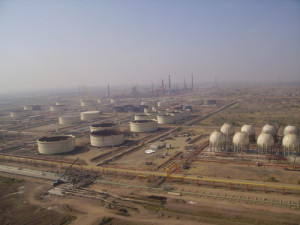Reuters reported that Russian oil major Rosneft and partners closed their $12.9 billion purchase of Indian refiner Essar Oil on August 21. Successful closing of the strategic deal for acquisition of 49% of Essar Oil gives them a foothold in one of the world’s fastest growing oil user markets. The deal is the first foray by Rosneft into Asia’s refining sector and the biggest foreign acquisition ever in India, as well as Russia’s largest outbound one. It also deepens Russian and Indian economic ties that stretch back to the Soviet era.
Kremlin-controlled Rosneft and its partners, global trader Trafigura and Russian fund UCP, purchased a 98.26% stake in Essar Oil in a deal announced in October. The rest of Essar will be held by retail investors.”Rosneft has entered the high-potential and fast-growing Asia Pacific market,” Rosneft’s Chief Executive Officer Igor Sechin said in a statement. The deal will enable Rosneft to improve the efficiency of fuel supplies to other nations in Asia, he added.
India’s oil demand is expected to rise by an average of 5.9% a year through 2020, among the fastest in the world, according to a report last month by Goldman Sachs. To capitalize on that, Rosneft and its partners are acquiring Essar’s high complexity oil refinery in Vadinar that can process 400,000 bpd (20 MMT) of crude. The refinery with an 11.8 Nelson Complexity Index rating is in the western Indian state of Gujarat. The deal includes a port, a power plant and 3,500 fuel stations.
Rosneft has previously announced deals to invest in downstream assets in China and Indonesia, but none of these facilities are yet functional. Tony Fountain, the chairman of Essar Oil under its new owners, said the company would increase its number of fuel stations to 6,000. Rosneft also plans to double Vadinar’s refining capacity and build petrochemical facilities. According to information available in the public domain from the International Energy Agency (IEA), the facility is currently operating at a 95.5% conversion rate and can process heavy and ultra heavy crude grades from Latin America, accounting for more than 50% of all processed feedstock.
Trafigura and Rosneft are the latest companies after Royal Dutch Shell and BP to enter the Indian fuel retailing market. The IEA predicts that by 2040, IEA predicts that by 2040 India’s automotive sector will be consuming 123 MMT of oil products annually, a 307% growth rate. The deal also reduces some of the strain on Essar Group, which is controlled by the billionaire Ruia brothers. Essar Capital director Prashant Ruia told a news conference the transaction would cut Essar Group’s debt by about $11 billion. Of that, $6 billion will be transferred to the new entity controlled by Rosneft, while $5 billion will be paid off. Essar Oil’s new owners will repay $600 million of the debt it is taking on to Indian lenders, and will also settle over 2 billion euros ($2.4 billion) owed to Iran for past oil purchases.








Leave a Reply
You must be logged in to post a comment.